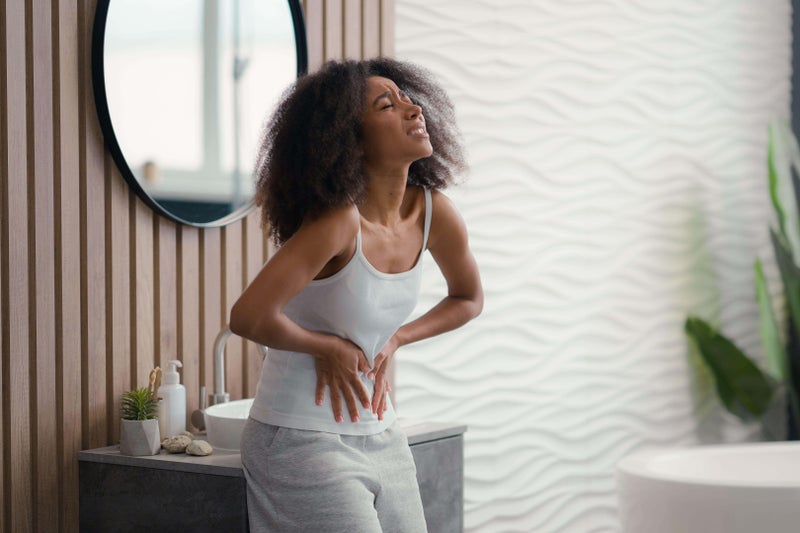Lots of people say that your first time might hurt ‘a bit’. But when I lost my virginity at 17 it was agony. It felt like everything inside me was burning and being pulled apart. I remember tensing my whole body, gritting my teeth, wanting it to stop.
![[Amy Roberts: I thought it was normal for sex to be painful]](https://metro.co.uk/wp-content/uploads/2024/12/SEI_233568384-f072-e1734453148371.jpg?quality=90&strip=all&w=646)
And the moment my boyfriend finished, I thought: ‘I never want to do that again.’. I have of course had sex since, but it has always been an ordeal rather than a pleasure. I have always experienced anxiety or dread at the prospect of sex, if it gets to that point of feeling like I can’t make another excuse to a partner.
![[Amy Roberts: I thought it was normal for sex to be painful]](https://metro.co.uk/wp-content/uploads/2024/12/SEI_233568371-59a6-e1734453301744.jpg?quality=90&strip=all&w=646)
For years I wondered why I couldn’t enjoy sex in the same way my friends did but it was only in 2019, after turning 35, that I got my answer: I have endometriosis. My symptoms started with my first period at the age of 13. Not only was it incredibly heavy – leading me to wear multiple sanitary pads because I was scared of leaking – but I wound up bed bound for days due to severe pain both in my pelvic region, lower back and when using the toilet.
![[Amy Roberts (head only) lying in a hospital bed with tubes going into her nose (Picture: Amy Roberts)]](https://metro.co.uk/wp-content/uploads/2024/12/SEI_233568372-46c4-e1734453002108.jpg?quality=90&strip=all&w=646)
Each month the symptoms were the same and I soon began to dread my period’s arrival. Knowing this wasn’t normal, I decided to speak to my GP with my mum. At that first appointment I was told I wasn’t special, and that painful periods were a part of life. But I knew something was wrong.
![[Amy Roberts: I thought it was normal for sex to be painful]](https://metro.co.uk/wp-content/uploads/2024/12/SEI_233568365-f4ab-e1734453539491.jpg?quality=90&strip=all&w=646)
However, no matter how many appointments I booked – sometimes as many as 10 times a year – my concerns were usually dismissed as me being overdramatic, or they’d suggest it must be irritable bowel syndrome (IBS). Sometimes, I’d have blood tests or be suggested various medications, but nothing ever worked. At no point during those 22 years, did a doctor ever recommend that I see a gynaecologist.
![[Amy Roberts: I thought it was normal for sex to be painful]](https://metro.co.uk/wp-content/uploads/2024/12/SEI_233568396-d62d-e1734453637902.jpg?quality=90&strip=all&w=646)
I even had one doctor tell me I was just ‘attention seeking’. If that was the case then why, when I was 15, did I spend an evening sitting on the toilet, crying in pain, wishing for a hysterectomy?. The whole ordeal made me miserable, so much so that at 16, I was prescribed antidepressants. They didn’t help at all, they just made me feel more isolated – and there was a lot more stigma around mental health then, so I was unable to talk about it.
I always thought my first time would be painful, but when the second, third, and fourth were still as painful, I realised that sex for me was going to be distressing, not enjoyable. But still, I just wanted to be a normal teenager, who had a ‘normal’ sex life with my boyfriend, despite my first experience.
So, I started faking orgasms. I just wanted to get sex over with as quickly as possible, and then run to the toilet to curl up in a ball, waiting for the pain to pass. I was too embarrassed to talk to my boyfriend about what I was experiencing, in case he saw me as broken, so I would make excuses.
And when I mentioned it to friends in passing, they brushed it off as pain from first-time sex. As I got older, I began to feel more confident discussing the pain with my partners. But I still didn’t know what was wrong with me, I didn’t have a diagnosis, with the exception of IBS, so it was quite difficult to get them to understand the severity of the symptoms.
And some boyfriends even thought I was still making excuses. Usually, we had to stop part way through sex, and then, after a while, we just stopped trying altogether. And that’s when, sadly, I learned the hard way that a relationship without sex isn’t much of a relationship at all.
I’ve often felt very lonely, spending most of my adult life single. Dating with a chronic condition is extremely challenging – I have a fear of rejection, and feel anxious thinking about having to share my health challenges with someone for the first time, all over again.
All the while doctors were still struggling to give me any real answers. Nobody, not even the nurses after seeing me in that much pain during cervical cancer screenings, told me that I was allowed to ask for a longer appointment, without any rushing, or to ask for a smaller speculum to help reduce that pain.
Nor do I believe they ever recorded my more than mild discomfort in my notes. I’d already spent my teens feeling like no one believed me, and right through my twenties, I never got the sense that had changed. I often felt like I was being gaslit, ignored and disregarded.
Not even when I got pregnant in 2013 at 29, only to heartbreakingly miscarry at 12 weeks, did it raise any red flags. It wasn’t until six years later, while having an open chat with a supportive colleague at work, that I learned other women have experienced these symptoms too.
‘That sounds like what my wife has’, he said, ‘It’s called endometriosis.’. I sat down with his wife, and we exchanged what we called ‘war stories’. I found that almost all of our symptoms matched up, it was like a weight had been lifted when I finally realised I wasn’t alone.































